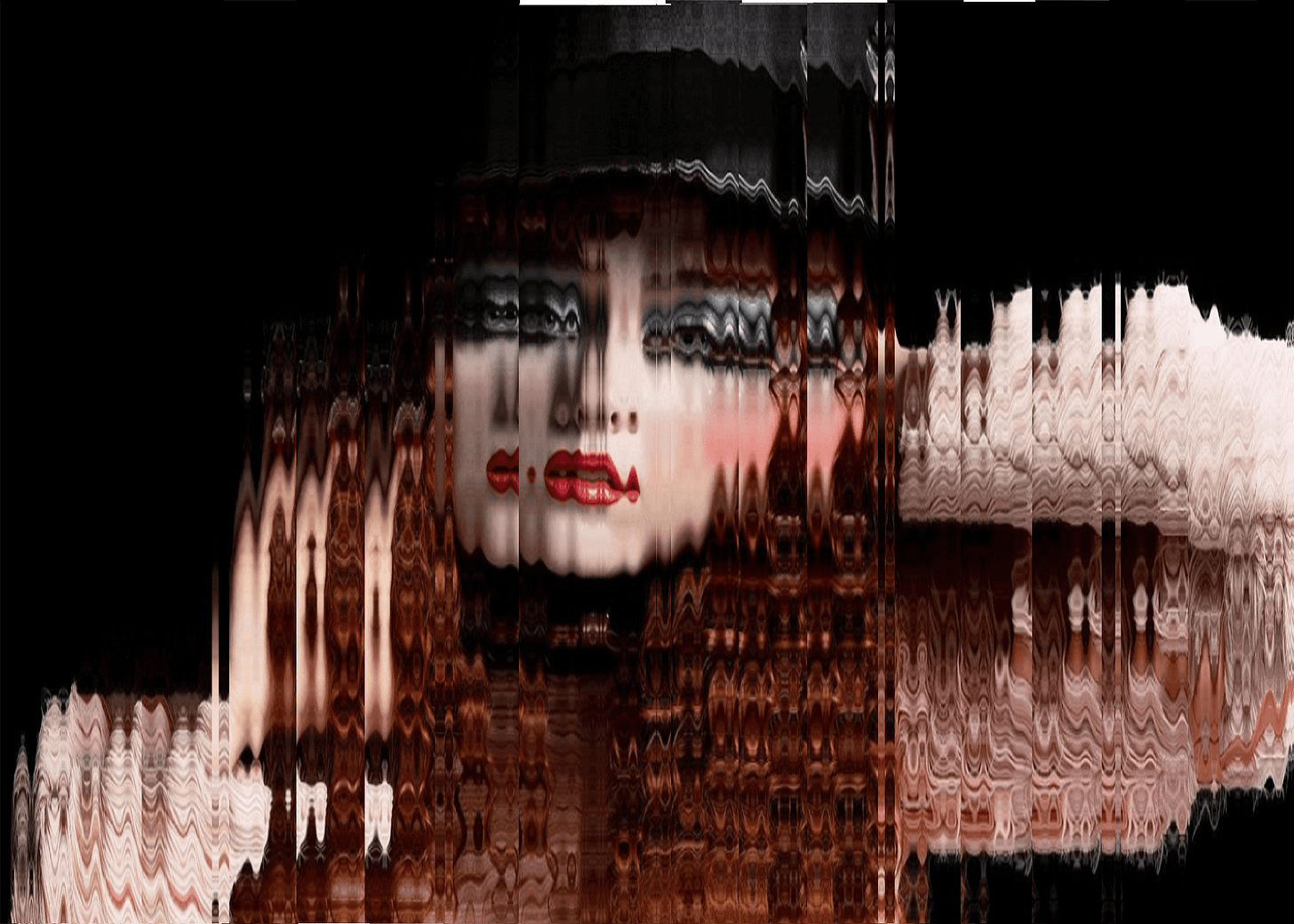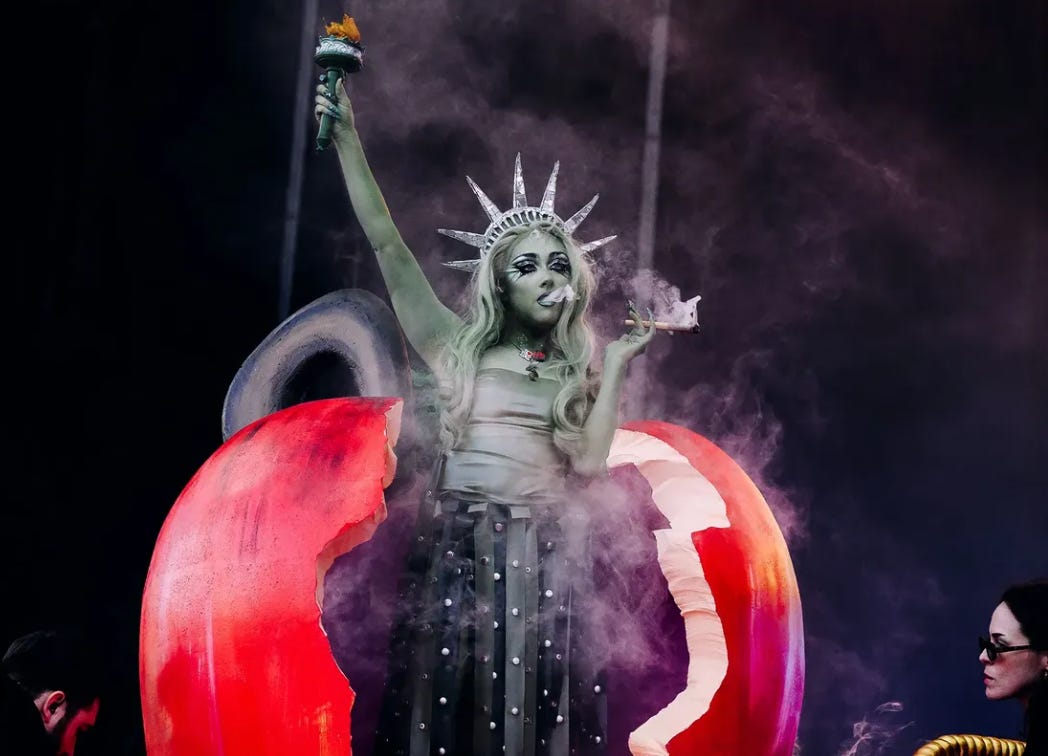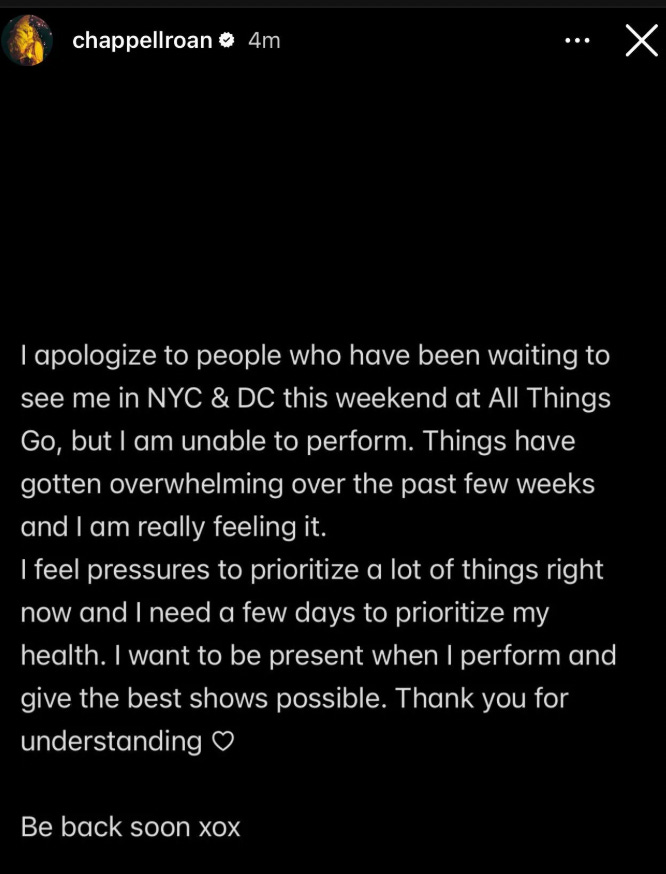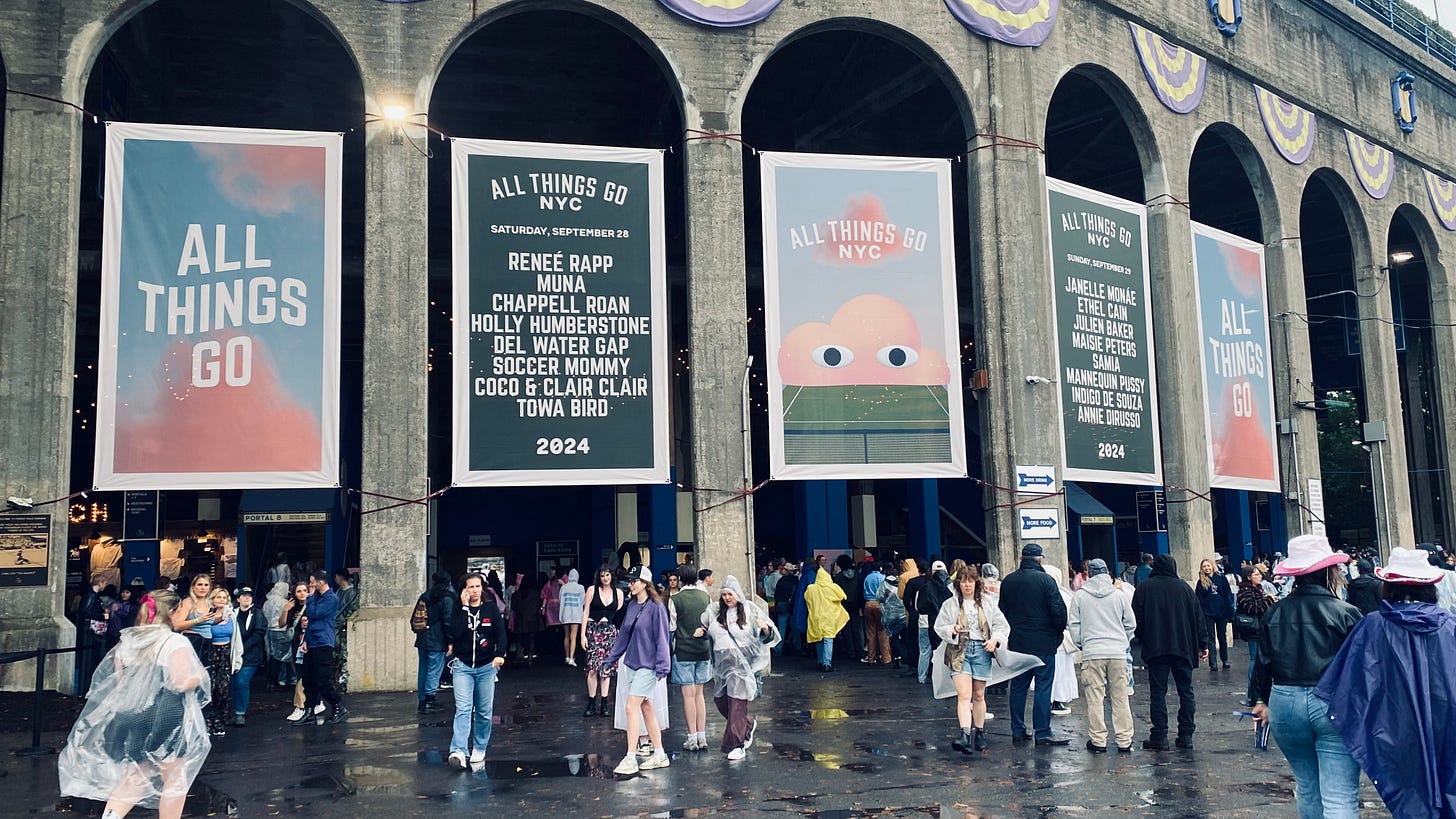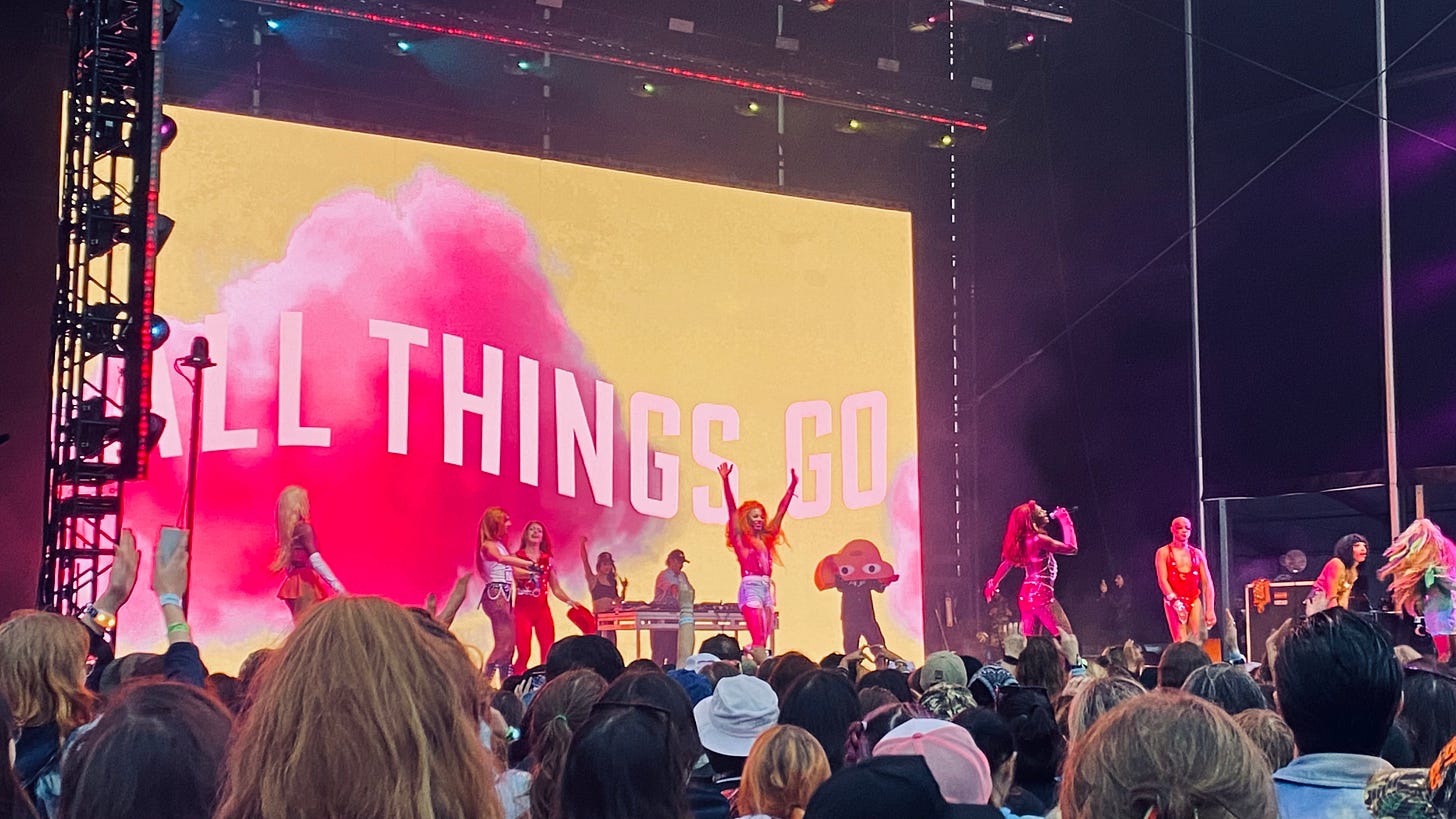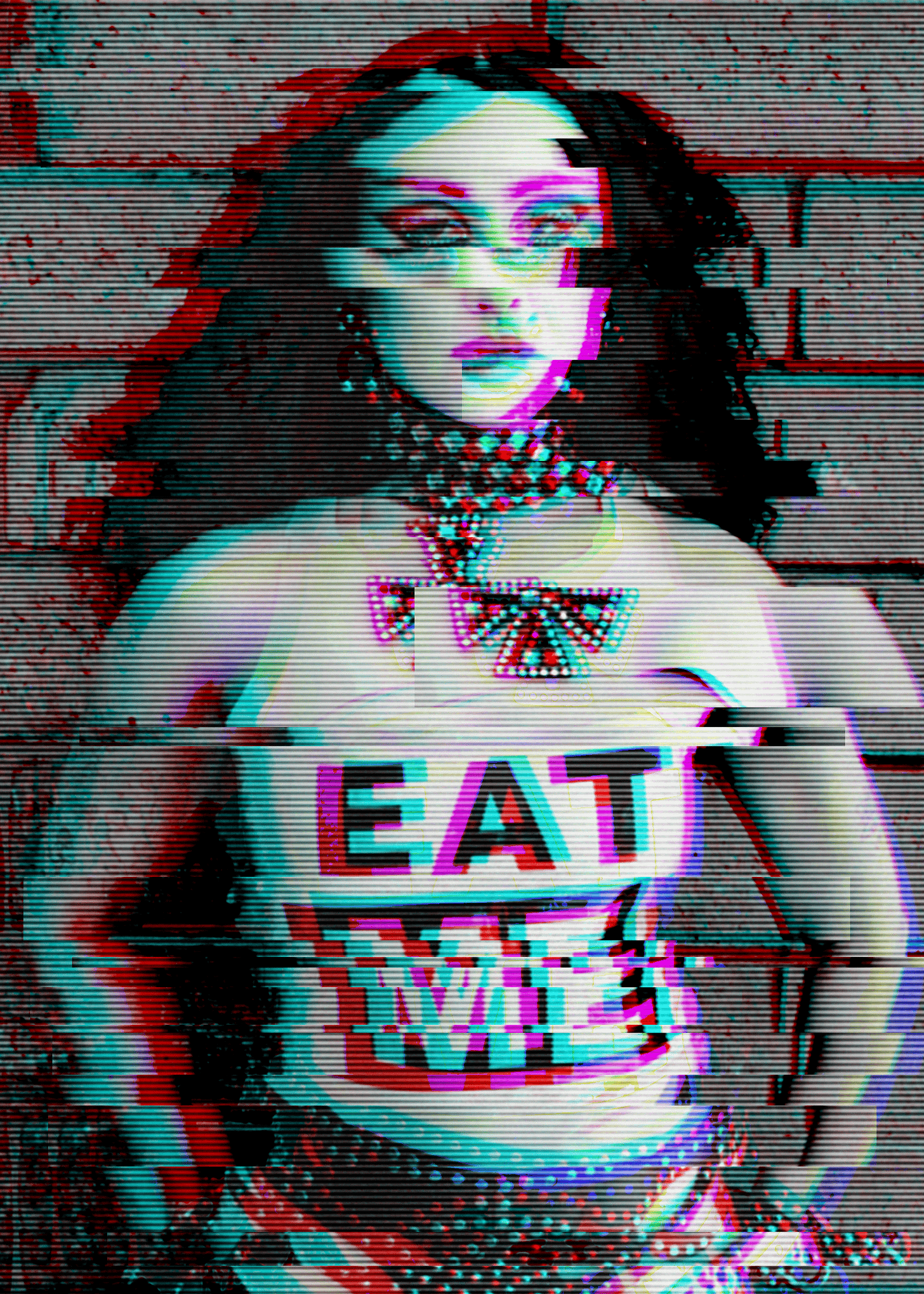All Things Go (Including Our Sanity) - A Chappell Roan Special
Celebrity is a mask that eats into the face.
There is something specifically first-world about the experience of being willing to spend hundreds of dollars on hotel, transportation, and entertainment just for it to be a gamble. Especially in a post-COVID world where millions fear not having a collection of great life experiences or being unable to afford them.
The world is entirely different now compared to the 2010s. Too many have realized that their routine grocery and online shopping trips offer little escape from reality. That the tiny convenient supercomputers in their pockets only display the depression of American politics, crafted images that everyone else is wealthier, and a constant stream of uninspired reboots from the 90s and 2000s during a drought of modern creativity.
So, it's easy, almost human nature, to be pulled in by the thrall of a rising pop sensation that can gather masses. In 2024, Chappell Roan, as that pop artist, cracked algorithmic social media virality during the first half of the year by performing as an opener for Olivia Rodrigo's Sour tour. She was distinct; a red-headed lesbian in drag. As simple as that, the image of sparkling pink cowboy-hatted crowds grew with each viral video of her performances. Each scroll making calculations behind the scenes that she was the next hot new thing that Renee Rapp once was that Billie Ellish used to be who Caroline Palocheck had been and whom Halsey was cut out of in the realm of present white girl/female pop. Chappell’s syncopating yodel, wrestling unitards, absolute lack of fear of performing on stage, and her hunger for fame won her the internet’s fickle heart.
But soon and eventually, the attention turned into intense scrutiny, leading to the challenges of a parasocial relationship with a woman whose name is Kayleigh and who was raised in a Midwestern conservative town in Missouri. Such as random kissing from strangers who were “fans”. Those same “fans” calling and appearing at her parents' house. Simultaneously, tickets for Chappell Roan’s first solo tour for her album The Rise & Fall of a Midwestern Princess skyrocketed to Beyoncé tour prices for her small theater shows with limited venue capacities.
Looking back at 2008, the difference between then, the era of Lady Gaga hermaphrodite rumors and Katy Perry’s faux-bisexuality and today is affordability. Reasonable ticket prices are a vague memory in the age of “dynamic pricing”, making the new recent breed of “pop girlies” into neo-recession core idols. From Disney-trained Sabrina Carpenter, Britney Spears-wannabe Tate McCrae, forever young cocaine-line-doing Charli XCX, to the first black female Grammy Rap award winner in two decades, Doechii - the music today is different, or at least trying to be distinct from the 2000s and 2010s. With half of the 2020s decade gone already, the more distinguished the sounds and aesthetics, the better they are as products sold and mass-distributed to a market that wants to see itself as individuals.
Simply put, the bigger the star, the more money management teams - as well as arenas, stadiums, and the endless black hole that is Ticketmaster - believe they can make. As a newly minted neo-recession idol herself, Chappell Roan’s online virality was a promise of return dividends for her management team’s pockets. Watching Chappell Roan’s solo tickets jump almost 400% in price, the same applied to the summer of the 2024 All Things Go Festival. After placing her as one of the headliners, those prices did rise, to the point that the festival, which originated as an affordable mid-Atlantic city event solely for Washington D.C., expanded to New York in Flushing, Queens, due to demand for the same weekend.
While on the business end, the process might have seemed simple enough, on the consumer’s side, already attempting to escape reality, there was nothing but stress and convoluted mechanics. Pre-sale codes. Long Ticketmaster queues. A sharp “ding” revealing a sea of gray and random spots of rapidly disappearing blue. Hidden fees, taxes, and additional insurance at checkout. Across the country, millions of live music enthusiasts with TikTok accounts self-soothed the reality of credit card debt by pulling out their phones to multiple unyielding tours and festival snippets of Pink Pony Club or HOT-TO-GO, the crowd growing each time. With more on the to-do list.
Scouring Expedia, Priceline, Booking.com, and so on. Lamenting in pity at everybody else stuck on automatic purchase waitlists or falling onto the sword of doubled prices on StubHub. Finding a cute outfit. Purchasing a cowboy hat and tights.
Remember, internet sensations appeal to the broad population bases of not just women and gays but also parents with easily influenced children. It’s easy to purchase what the market decided was worth almost $400-500 when it reaches even the youth. It’s why Joe Biden pre-election dropout attempted to invite Chappell Roan to the White House and was subsequently flipped off by her appearance as a painted Statue of Liberty in drag with ass-less chaps for his trouble at the Governor’s Ball Festival within the same month. With a joint in hand, she said, “I’m not going to go to the White House because I am not going to be a monkey for Pride.” After that, it became known that Chappell characteristically used drag to make political statements about the Democratic Party’s flawed approach to meeting the needs of the marginalized, many of whom are her fans.
It may also be why Chappell felt the need to speak out about her lack of endorsement for Kamala Harris regarding the 2024 presidential election when Biden stepped down at a critical point. Democracy was “on the line”. It was the Criminal versus the Cop. Who would best resolve the “complicated” geopolitical issues in the Middle East between Gaza and Israel during the supposed height of inflation? Who was going to fix America better? These questions were prefaced by fellow neo-recession idol Charli XCX, who neither American nor can vote in American elections, tweeted on X, formally, belovedly known as Twitter, that “Kamala is Brat.” After going viral enough to encourage SNL skits and Good Morning America roundtable talk, the intensity of coconut memes alongside Kamala’s laughter utilizing songs like 365 and Apple from Charli’s own popular 2024 summer album Brat had a cultural impact. Enough to encourage liberal and left-leaning opinion/strategy that pop culture icons, celebrities, singers, actors, and so on needed to endorse the Democratic party to win in place of running on human rights they’ve already lost in the last decade. Once Taylor Swift posted a picture of herself with her cat officially endorsing Kamala post-debate, the precedent was set for legacy celebrities to get involved.
So, when Chappell Roan decided to film herself in her hotel room appearing like she just woke up on TikTok expressing her disapproval of endorsing Kamala Harris for president, people on the internet paid attention. It was the very week of the All Things Go Festival. A few weeks before the election. What did she have to say? To think critically before voting for Kamala Harris. That Democratic party has failed to convince her, and by extension, young voters, of the belief in their rhetoric.
What’s unfortunate about TikTok is that people can also do more than just listen; they can respond in stitches. Worse for Chappell, her online audience was majorly both if not queer, then non-white because of her drag imagery. So, once she said, “there are problems on both sides,” it was clear to many that Chappell’s own privilege blinded her from others' perspectives. Whoever disagreed with Chappell questioning Kamala’s capacity to figure out a ceasefire that many progressives wanted was met with the follow-up to, “do your own research,” for a query of endorsement that she prompted herself to answer.
The negative response she received prompted an immediate follow-up video, where she exclaimed that her words had been taken out of context, twisted, and misconstrued. After which she yelled, “I’m voting for Ka-MUhla! Fuck!” as if this would better successfully get her point across. The microaggression of the feigning difficulty in pronouncing a six-letter foreign non-American name was not missed.
In the Rolling Stones cover story, “Chappell Roan Is a Pop Supernova. Nothing About It Has Been Easy”, the star has erred on the side of illuminating from her perspective that they are good people on both sides of the aisle. For Chappell, there is a distinction that people from the coast or northern states can’t fully understand. From a white woman from the Midwest with family members who are most likely Trump supporters, this makes sense. As a pop sensation with the ability to amass a large following of people in the millions willing to listen to her every word, her pre-All Things Go Festival TikTok “crash-out” was an inevitability.
In the best way, Chappell struggled to convey that many people overlook that while it's great to support a candidate to motivate others to register to vote, it's also important for voters to do their research. To make well-informed decisions by considering all measures, including bottom-up local issues and not just focusing on the presidential candidates. Chappell asserts that this is the only real power people have in a country that somewhat values the rule of law. She also makes a poignant point that even if a star does endorse a candidate, it does not mean that they themselves will vote for them. However, her lack of follow-through on her stance shakes her foundational appropriated individualism and character. Creating the threat that she may be a talking caricature of white queerness that can only talk the talk but can't walk on what they speak on.
Chappell Roan’s late September Tuesday internet spectacle became a sudden Friday cancellation of her and her band from their set for the Saturday festival, all in one week. Mid-flight, train departure, or hotel check-in, thousands looked at an Instagram message of her canceling her appearance due to her mental health. With less than 24-hour notice, there was even a heart emoji for the urgency. At the same time, the $400 ticket prices fell to $40-50 for access to the two-day weekend.
Her absence from the festival itself was thoroughly felt, but not for lack of good music. Janelle Monae was there performing her immaculate House of Pleasure set, as was Ethel Cain, MUNA, Renee Rapp, Julien Baker, and many more queer artists. But Chappell Roan canceled way too soon for the probably underpaid Queens stadium workers to take her name down from all the flags and colored placards surrounding the building and stands. And it was far too late to change any of the merchandise from shirts with graphic skeletons wearing pink cowboy hats and boots to posters and memorabilia, all with her name on them
So, who replaced Chappell Roan’s set? A randomly arranged collection of popular New York City drag queens, some of whom have appeared and even won the popular VH1 reality TV show, RuPaul’s Drag Race. The replacement set? A Chappell Roan-themed dance party, so that the people technically get what they paid for. With that, and how Chappell herself both takes from drag culture and uses her platform to raise funds for Palestinian relief at her tour shows while increasing visibility towards social issues close to her heart, wouldn’t it make sense to at least list out these queens' names for performing in her stead? Give them that visibility that had millions of parasocially attached strangers tuned into the same 26-year-old’s political thoughts, whose very songs they’ve learned at the last minute to lip-sync to on stage in front of thousands in the rain?
Fame isn’t easy. There seems to be stalking, the assertion and re-assertion of boundaries, and unchecked one-sided intimacy involved. Some forget that when performers perform, they are “at work”. Same as everyone else. But fame also comes with power tied to systems, and the one with the most influence at this given time is based on money. This is the reality of capitalism. Blame Adam Smith. Chappell may stand for her minority and queer fans with basic understanding that they are treated less than by society, but her songs are also used in B-list movie promos and to sell fast fashion. Her time to criticize the machine is running out as she is absorbed into its machinations as one of its marketing entertainment avatars. This essentially will water down her impact as a “queer icon”.
Two days before months-long pre-established tour dates in Paris, Amsterdam, and Berlin, Chappell posted on Instagram her inability to perform due to scheduling conflicts, cosigned with a frowny face for effect. According to popular internet opinion, that time taken from her fans may have been reserved for rehearsals for her performance of Good Luck, Babe at the MTV Video Music Awards. Look at her butt in the chainmail suit they put her in, and the fire and dancing shirtless men! She should be given grace because Britney Spears currently makes unsettling knife-dancing Instagram videos now that she's post-conservatorship, and Kurt Cobain is dead.
Still, in the absence of sound, the lack of acknowledgment of these drag queens’ efforts is the most deafening. Perhaps because Chappell Roan is a star now, with a legal team behind her, acknowledging fault on that level would be bad. And with the moving parts from management to coordinators to where the money flows contract-wise, the specific amount of finger-pointing is better bandaged up by a mental health crisis as opposed to the flakiness of a white lesbian in the end.
Still, here are the names of the enigmatic, radiant, grand Drag Queens who came out and performed at the 2024 All Things Go Festival, with little notice or preparation, and who gave their souls to the (somewhat lackluster) crowd: Beaujangles, Reese Havoc, Yvie Oddly, Hanukah Lewinsky, Dev Doee, Monique Heart, Mo’Riah, Aqauria, and Kevin Aviance. Imagine a real life Lip Sync For Your Life with genuine underlying thunder beneath grey storm clouds on top of a crowd of queers in clear ponchos holding white claws, overpriced chicken tenders, and ranch seasoned fries. Monique Heart using her Drag Race mid-show interview skills and natural charisma to MC the set as Yvie Oddly fights past her health problems to vogue and whack as elegantly as she can, hinting at past possible contortions of her body. Voguing and posing. Backbends and one or two splits. Aquaria and Mo’Riah choreographing mid-performance, in motion and half-thought, during the real-time event.
There was a surprise-group-elimination energy to it. The flailing, the pointing, the twirling, the unknown words, the arm waving, levying some residual enjoyment from the half-soaked crowd. The drag of it all. They were amazing, and it would have been lovely if Chappell Roan could have made at least a post acknowledging them, the same way she “had” to make a post referencing the 2024 election at a pivotal time. If she felt that it was that important to speak out against endorsing Kamala Harris because of her geo-political understanding of the then landscape, believing she could predict the severity of her actions, then Chappell should own that. Instead, that moment serves as the last openly non-media trained political opinion the public will ever receive from Chappell Roan again. At present, not only has her entire prior political rhetoric been scrubbed from how she relates musically with her audience, retrofitted into something cleaner and ambivalent, but also the entire incident itself can be considered cleanly rugswept from even the original hotel video that started the entire mess.
It's intriguing to see someone who was once unknown rise. However, there are risks involved that Chappell, as a new player in the market and popular music, hasn't fully acknowledged regarding authenticity and freedom. While she can don the heavy face paint and lashes, bold eyeliner, and Gothic makeup reminiscent of a John Waters-style Divine-coded drag queen, it's important to recognize that actual drag queens—black, brown, trans, and queer—had to step in and support her professionally, without receiving the credibility or public acknowledgment from the festival that hired her. This is the same festival that bought, promoted, and sold merchandise in her name. She made political statements that her public persona couldn't uphold because drag itself is inherently political. Achieving fame solely through talent is one thing, but representing the same queer community that fought for recognition during the Stonewall Riots—whose imagery was only marginally popularized by Madonna during the tailend of the AIDS crisis in the early 90s—adds another layer of complexity. So maybe it was for the best that the genuine, basic art of drag was on the All Things Go stage that weekend in New York from originators of the very image that made Chappell Roan famous and known in the first place.



